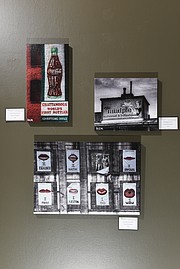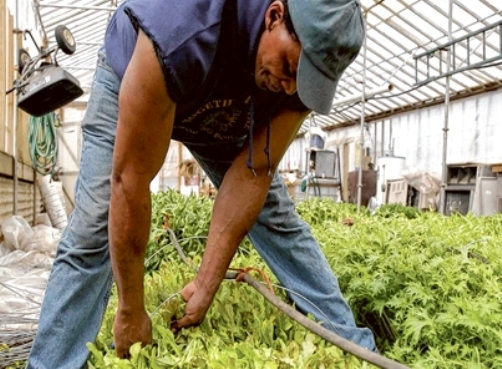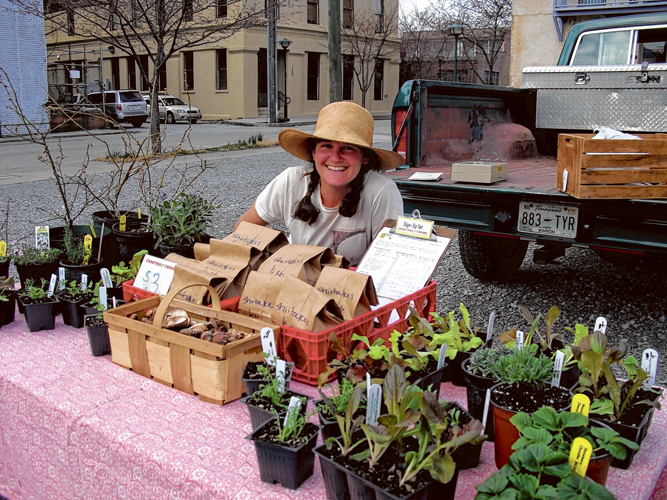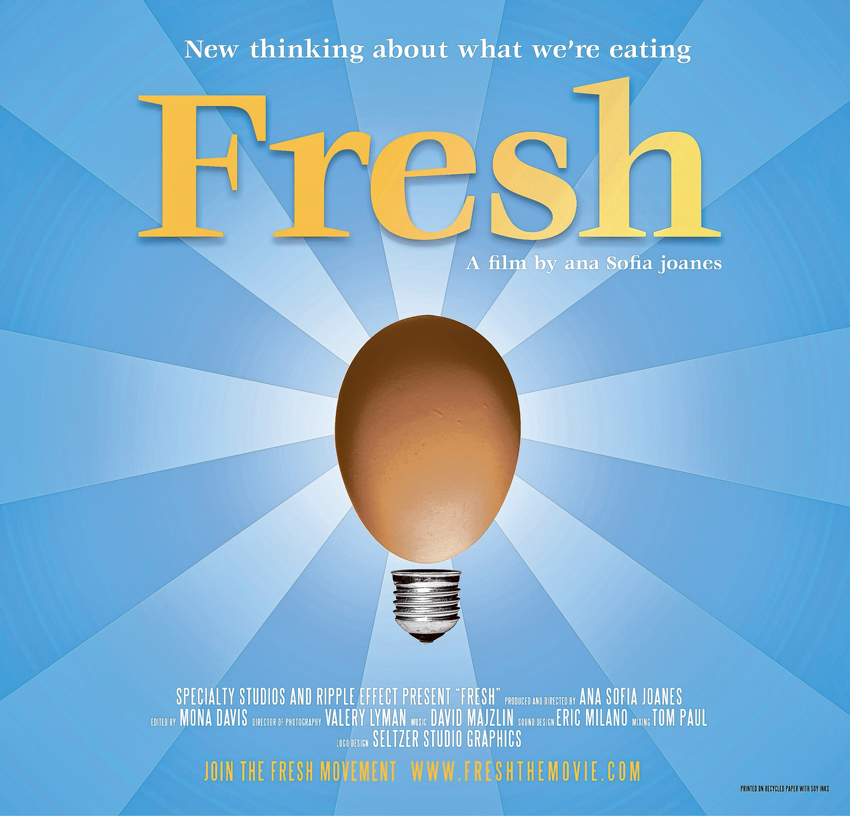Hunter Lecture Series speaker, Will Allen, will plant a seed for success in Chattanooga February 26
"Food is at the foundation but it's really about life."
Such are the words of Will Allen, the 63-yearold one-time professional basketball player turned farmer. A 2008 MacArthur Foundation Genius Grant recipient for his contribution to urban farming and sustainable food production, Allen will speak in Chattanooga February 26 at the George T. Hunter Lecture Series.
He's also the founder of Growing Power, a nonprofit urban farming project in Milwaukee, Wisconsin - not exactly a place you might think of as a gardening utopia, unless by utopia you mean two farms totaling 140 acres whose combined facilities include seven greenhouses, indoor and outdoor training gardens, a working kitchen and an aquaculture system where fish, worms, bees, goats, chickens, turkeys and ducks are raised, and where workshops and demonstrations in fish farming, aquaponics (raising fish and crops together), vermiculture (worm farming), horticulture, small and large scale composting, soil reclamation, food distribution and marketing are conducted.
Healthy Food, Healthy Communities
If that's what you mean by utopia, then, go ahead and call Growing Power's Milwaukee farms and training hubs a utopia; it's doubtful anyone will argue with you. Because in addition to educating communities about how to produce and distribute healthy, sustainably grown food, Growing Power is dedicated to making sure that that food is available to people living in so-called "urban deserts:" economically distressed areas where the only access to food is at the corner quick-mart alongside beer and cigarettes.
ABOUT WILL ALLEN2005 Ford Foundation leadership grant on behalf of his urban farming work.2008 MacArthur Foundation Genius Grantfor his work on urban farming and sustainable food production.2009 Kellogg Foundation grant recipient, to create jobs in urban agriculture.2012 Honorary Doctor of Agriculture degree awarded from the University of Wisconsin-Milwaukee
It's the old Chinese proverb brought to life: "Give a man a fish and you feed him for a day; teach a man to fish and you feed him for a lifetime." The nonprofit takes its healthy, homegrown meats and produce to the communities around Milwaukee that need it most, and, at the same time, brings them the expertise they need to begin to produce it themselves. Through lively demonstrations, a willingness to partner with individuals and organizations, and actual, physical, hands-on help in establishing urban farms and gardens, Growing Power is giving communities the power to grow healthy food, which in turn grows powerful communities.
For Allen, the son of sharecroppers who was raised on a small vegetable farm in Rockville, Maryland, sustainable farming is more than a wave of the future. It is a return to small-scale, conscientious farming methods in the interest of safeguarding our future. Called "one of the most influential leaders of the food security and urban farming movement" (along with Michael Pollan, Michael Bittman and Vandana Shiva), Allen is intent on spreading the word about healthy, sustainable food production. He has written a book on the subject (The Good Food Revolution: Growing Healthy Food, People and Communities, co-authored with Charles Wilson and published by Gotham Books), and is featured in the film documentary FRESH, which will be shown at several area schools this February, and to the general public.
IF YOU GO
Will Allen will be at the Roland Hayes Auditorium at the UTC Fine Arts Center at 7 p.m. as part of the Hunter Lecture Series, February 26th.
An ex-professional basketball player, he's now an urban farming activist, has won a MacArthur Genius award, and is featured (along with his nonprofit farm, Growing Power) in a documentary about those who are reinventing our food system called Fresh.
Gaining Ground
I sat down with Jeff Pfitzer, program officer for the Benwood Foundation and director of Chattanooga's Gaining Ground initiative, which provides funding and support to the local sustainable food movement. Their motive: to bring healthier, fresher food options to the region. Their means: by helping to foster "collaborative partnerships among local farmers, markets, wholesalers, agencies, schools and chefs."
We talked about Will Allen, Benwood Foundation's role in the local food movement, his thoughts on how Chattanooga stacks up against other cities of similar size, and where we are headed, food-wise, as a community.
"There is a strong local food movement sweeping the nation, and Chattanooga is definitely riding that wave," Pfitzer says. "We've gone from one market on Sunday to six markets. Some, like the Main Street Market, are now selling locally grown fresh produce year-round. Those are big strides."
When asked why the uptick in farmers markets and community involvement, Pfitzer says the reasons are varied.
"Some folks come to local food because they are interested in humane animal treatment, some because they are interested in environmental issues related to food."
Overall, he says, people are becoming more aware - aware of the dangers of industrial farming, aware of the health benefits of locally grown and raised food. They understand that even local conventional (non-organic) farmers, because they are producing on a smaller scale, tend to practice better soil stewardship and use fewer pesticides than large, industrial farmers. So the small farmer's food is likely to be cleaner, and it's definitely fresher than that which is trucked in. And with more demand from individuals for fresh food comes more demand from local restaurants.
"They also value the chance to interact with the farmers [at the markets], to have a conversation about how their produce and animals are raised," Pfitzer adds.
Gaining Ground certifies farms within a 100-mile radius of Chattanooga with the Harvested Here label. Customers need only look for that to know the food they are buying was grown locally. I ask Pfitzer how they can be certain a farmer isn't buying his produce from a large-scale distributer and claiming to be local.
"There is a strong local food movement sweeping the nation, and Chattanooga is definitely riding that wave."
"There's an integrity to the movement," he says. "I'm sure there are people who could figure out how to resell non-local produce but our area farmers markets tend to self-police. And area restaurants know if they are getting a box of tomatoes that came from Venezuela or one that came from Sand Mountain. They're fresher."
Pfitzer is excited about Will Allen coming to Chattanooga. "The George T. Hunter Lecture Series is designed to stimulate thought and conversation. It's 'big picture' discourse. We don't have an agenda. We are open to whatever conversations come out of the community.
Say I'm an entrepreneur and I want to do a high-intensity farming project like his. I'd want to know how he raised start-up capital, how he did community outreach and education, what his operating budget was, how he got cash flow."
Or, he says, the conversation could be more philosophical: How do we mobilize our community to decrease food insecurity? How do we marshal a shift in the way we think about what we eat, so that we aren't happy to settle for the cheapest, fastest food we can find? How do we get back to the place where we are feeding ourselves with food we have produced ourselves? How do we get back to a place where food grown and harvested locally feeds that community, which in turn feeds the farmers who grow it, which in turn feeds community itself?
"We've forgotten how to do that," says Pfitzer, "to our own demise. We (Americans) pay the least percentage of our income for food than anyone else in the world, and we have the highest cost of health care. They are related. We are paying for bad food with poor health and fragmentation of community."
Screening of FRESH, a documentary by Ana Sofia Joanes, will be held at Barking Legs Theatre February 12 from 6-8 p.m.The sponsors for the screening are Benwood, Gaining Ground, Urban League, Crabtree Farms and YPAC .
It's a sobering sentiment that is echoed in the documentary, FRESH: "Cheap food is an illusion."
Pfitzer admits it's not an easy job getting the community on board in areas where access to healthy, fresh local food is limited. To that end, Gaining Ground, in partnership with the YMCA, the Health Department and the Food Bank, has created the Mobile Market. The Mobile Market is literally a market on wheels. It's a large trailer set up like a grocery store inside with shelves, aisles wide enough to accommodate a dozen people at a time comfortably, and refrigerated coolers for perishables. Offering approximately 80 healthy staples such as rice, beans and flour, and seasonally appropriate, locally grown fruits and vegetables, the Mobile Market addresses the three main barriers to healthy eating that those in underserved communities face: access, price and education.
The Mobile Market stops twice a week in select neighborhoods (Emma Wheeler Homes, Orchard Knob Elementary and Gateway Towers to name just a few) for two hours at a time. (A complete schedule is viewable at Chattanoogamobilemarket. org.) In keeping with Gaining Ground's mission to not only give a fish but teach how to fish, the Mobile Market also conducts occasional cooking demonstrations right outside the trailer - because let's face it, healthy food is only as healthy as how it's prepared. The prices? Comparable to grocery stores in the area, says Pfitzer.
"Our goal is not to compete with other markets but to offer an alternative," he explains.
Asked how Gaining Ground reaches out to local farmers, Pfitzer says the key lies in raising awareness in both farmers and consumers.
"We try to help farmers with cultivation of business skills, and to help farmers and chefs determine what barriers are keeping them from working better together. We are constantly exploring ways to help strengthen the economic side of the equation. Farmers need to make a living wage."
And as for the movement itself?
"We don't expect sudden sea change," says Pfitzer. "We just want to make it a little easier for people to choose well." And everything Gaining Ground does - from supporting markets like the Main Street Market, to providing funds to Crabtree Farms for the production of Tastebuds magazine (an indispensable guide to all foods locally produced including community-supported agriculture programs), to putting together a local food map, adds up. With more people talking about, and choosing, local, sustainably produced food, there is a growing consciousness in our community. And as we are gaining ground in consciousness, there is, undeniably, a growing power in community.
GAINING GROUNDFor more information about Gaining Ground, go to growchattanooga.org.There you will find information and schedules of area farmers markets, an online local food guide, a list of restaurants using local produce, information about the Mobile Market, links to cookbooks, suggestions for how you can get involved, and much more.




